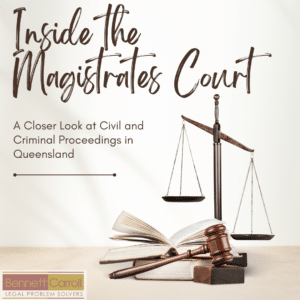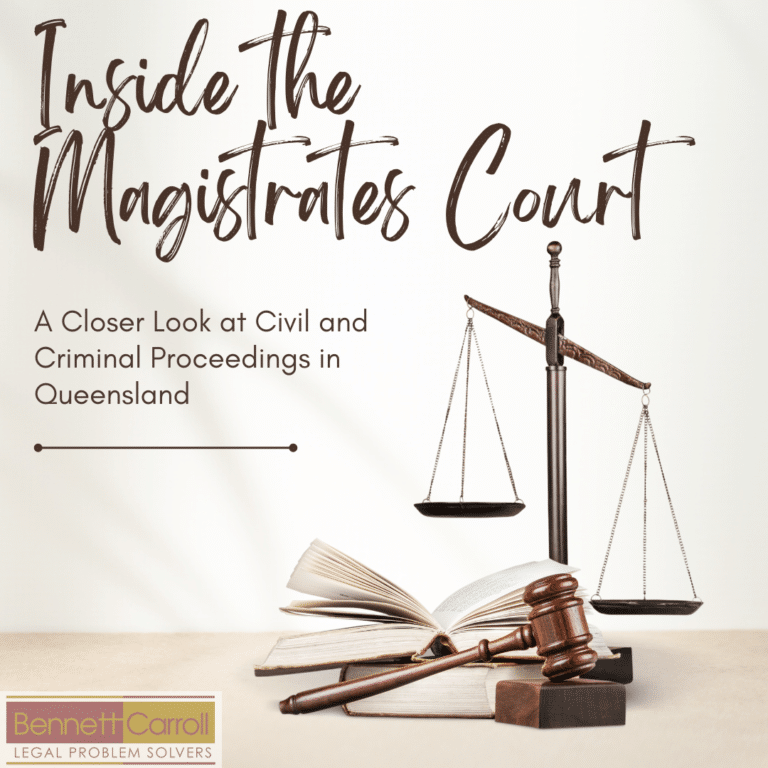The Magistrates Court, serves as a crucial component of the legal system in Queensland. It is the first port of call for a wide range of civil and criminal matters, playing a pivotal role in resolving disputes, delivering justice, and upholding the rule of law. In this article, we will explore what happens inside the Magistrates Court, the types of cases it handles, and the key procedures involved in civil and criminal proceedings.
Understanding the Magistrates Court
The Magistrates Court is a lower court that operates within the hierarchy of the judicial system. It deals with cases of lesser gravity than those handled by higher courts, such as the District Court, High Court or the Supreme Court. The court is presided over by a magistrate who has the authority to adjudicate on both civil and criminal matters.
Civil Proceedings in the Magistrates Court
Civil cases in the Magistrates Court typically involve disputes between individuals, organizations, or entities seeking resolution for matters such as contract breaches, debt recovery, property disputes, and small claims. Here’s an overview of the key stages in civil proceedings:
- Filing the Claim: The process begins when the plaintiff (the person or entity initiating the claim) files a complaint or claim with the court. This document outlines the details of the dispute and the remedy sought.
- Service of Documents: Once the claim is filed, the plaintiff must ensure that a copy of the claim is served on the defendant (the party against whom the claim is made) in a legally acceptable manner.
- Defence: The defendant must respond to the claim by entering an appearance, acknowledging receipt of the claim, and indicating whether they will be defending the matter.
- Case Management: The court may schedule a case management conference to identify key issues, encourage settlement, and set timelines for evidence submission and trial preparation.
- Hearing and Judgment: If the dispute is not resolved through mediation or settlement, a hearing will take place. During the hearing, both parties present their evidence and legal arguments. The magistrate then delivers a judgment, either on the same day or at a later date.
Criminal Proceedings in the Magistrates Court
The Magistrates Court deals with less serious criminal offenses, often referred to as summary offenses or misdemeanours. Major criminal offenses, known as indictable offenses, are typically handled in higher courts. Here’s an overview of the key stages in criminal proceedings:
- Charge and Arrest: When law enforcement authorities suspect an individual of committing a summary offense, they may arrest the person and bring formal charges against them.
- First Court Appearance: The police will issue a Notice to Appear for the accused to appear before the presiding Magistrates Court in the region where the charges have been laid. The accused must attend the Court on this date. The purpose of this court appearance is to bring the accused before the court for their initial appearance, where they are informed of the charges and their legal rights. Often the accused will seek an adjournment for legal advice and the retention of a lawyer.
- Plea: Before the accused enters a plea, often additional hearings can be held to seek further adjournments if required, while the prosecution and the accused lawyers liaise and endeavour to resolve the charge if possible. If no resolution can be reached, the accused will need to enter their plea. This is called the arraignment hearing where the accused’s charges are read out to them before the court and the accused enters their plea of guilty or not guilty. If a guilty plea is entered, the magistrate may proceed to sentencing or an adjournment may be sought for sentencing at a later date. If the accused pleads not guilty, a trial date is set.
- Trial: The trial takes place before the magistrate, who assesses the evidence presented by both the prosecution and the defence. Witnesses may be called to testify, and the accused has the right to cross-examine them.
- Verdict and Sentencing: After considering all the evidence, the magistrate delivers a verdict of guilty or not guilty. If the accused is found guilty, the magistrate determines an appropriate sentence.
There are other steps of course such as committal hearings and registry committals for more serious charges, but this list provides a useful overview of the life cycle for most matters.
Appeals from the Magistrates Court
Decisions made by the Magistrates Court can often be appealed to a higher court. The appeals process allows parties dissatisfied with the outcome of their case to have the decision reviewed by a higher authority.
Conclusion
The Magistrates Court plays a vital role in the legal system, providing accessible and efficient resolution for both civil and criminal matters. From resolving disputes between parties to upholding the rule of law through criminal proceedings, the Magistrates Court is an essential pillar of justice. Whether it’s a contractual disagreement or a summary offense, the court serves as a cornerstone for individuals seeking justice and protection of their rights.
Don’t navigate the legal system alone. Whether it’s a civil dispute or a criminal matter, our dedicated team is here to protect your rights. Schedule a consultation to discuss your case and explore your legal options. Call us on or email and safeguard your interests every step of the way- We are your legal problem solvers.








